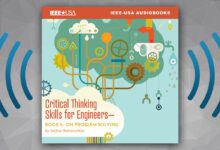
I wanted to become an IEEE-USA Congressional Fellow because I was convinced that Congress needed input from engineers, and that I could be one source of that input. Now that I have completed my Fellowship, I am delighted to report that Congress did need my help, that they accepted my help, and that I gained a great deal personally and professionally from the experience.
I worked for the Senate Permanent Subcommittee on Investigation (PSI), chaired by Senator Carl Levin, which investigates fraud, corruption and abuse that has a large and broad impact on U.S. Citizens. The PSI was very open to leveraging my software engineering skills (about 10 percent of my time), while allowing me to do legal and investigative work, I really enjoyed (80 percent of my time). The remaining portion of my duties was quintessentially Congressional tasks that I requested to participate in to the get the full breadth of being a staffer on the hill. For example, staffing a markup was something I was able to do. In that capacity, I would learn about a bill and/or set of nominations that was going to be handled on the full committee. I would then create binders filled with briefs on each bill or nominee. Finally, I would then provide the binder to senior staff for review. Each item briefed would include a recommendation on how staff thought the Senator should vote and why. The briefs would especially call out bills or nominees that would be controversial, with details provided on why there was disagreement. The Senator always read these in detail and would often surprise me with how much he already knew prior to seeing anything I had provided. Once in final form, the binder and I would head to the committee meeting and I would sit behind the Senator ready to answer any questions he might have about each issue as they were debated and voted on.
When I was first assigned my duties as an investigator, I was asked to look through hundreds of thousands of documents (millions of pages) and identify the 500 or fewer documents that would be important to the investigation. Of course, it took me a while to learn the facts and the law related to the case and to learn from senior Investigators what they were looking for. Once I did, I realized that there were quite a few identical documents. These included documents that were sent around to many people in an organization by email and that were also on a file server in more than one place. I also realized that there were many that were quite similar but not identical. These might be daily reports that could be used to create graphs and charts, but were not something an investigator would need to examine individually. PSI has software for viewing and marking the documents, but I could see right away they could benefit from more advanced software that could HASH the files to identify duplicates, group similar files and separate those from emails and handwritten documents that were more likely to show the actions and intentions of the people and organizations being investigated. Congress needed my help!
I confirmed with the Lead Investigator the parameters of what I was permitted to do on weekends and evenings, and started devising custom code and procedures to save myself and other investigators time, and to help us access the most important documents sooner. This process included a series of scripts to be run periodically, especially when new documents arrived in the tens of thousands. It also included procedures to be followed for tagging documents that resulted from the scripts so they could be sorted and reviewed in a way that best used subcommittee resources. I completed the basic scripts, a spreadsheet to track the process, and a procedure manual for junior staff members (law clerks and law students) to follow so we could feed only the very best documents to Senior Investigators. This work was completed in about two weeks of nights and weekends. Everyone at PSI involved in the investigations to whom I applied the tools were grateful once they learned to trust the system, although not everybody learned what HASHVALUEs are and how I was using them. A hash value is a result of a calculation (hash algorithm) that can be performed on a string of text, electronic file or entire hard drive contents. The result is also referred to as a checksum, hash code or hashes � and they are generally many times shorter than the string used to generate the hash. Hashes can be used to compare long strings to see if they are identical by comparing just the hashes instead of the entire string. Some graduates of top law schools who work as clerks embraced the techniques right away, seeing great value. Others, however, saw this as IT work and quite frankly felt it was more appropriate for an IT person to apply, but they all liked the results and the procedure saved person years of time in the 15 months I was there helping them use it. Congress accepted my help!
Looking back on my year, I realize now how much I gained personally and professionally from my time in Congress. I improved my interpersonal skills and communication skills. I drafted letters to agencies and offices (including President Obama) for Senator Levin. I drafted briefs for Senior Investigators and Senator Levin, and I briefed the Senator in person. All of this improved my written and spoken communication skills in ways I simply would not have achieved under any other circumstances. Nothing like drafting a letter to the President for a Senator to focus your mind on your writing! The senior investigators and Senator Levin were all not only experts in the areas we investigated, but they are also attorneys with many years of practice experience and superior questioning and investigative skills, which again gave me experience in rhetoric, questioning and argument that few if any other jobs could have provided.
The final personal development aspect I gained was my perspective on policy and how people are impacted by it. In my software career, I have contributed to systems that changed how billions of people live on a daily basis, but it was really limited to a narrow technological viewpoint. Working for Senator Levin, I saw many other aspects of how policy impacts people. The entire experience has informed what I want to do with the rest of my life in ways that I could not have imagined when I started. Professionally, I became an attorney just before I arrived at PSI, so it was terrific to work with such seasoned veterans. Many staff had prior experience at law firms, federal agencies or self-regulatory organizations. I got excellent mentoring from them not only on how things are done in the Senate, but also on how outside counsel practicing before the Senate was doing things, and how that would be different from a courtroom. I truly gained a great deal from my time as a Fellow!
Based on the professional and personal development I have experienced in the Fellowship, I have located a position with a start-up that can use my legal, engineering and business skills. The product we have developed provides natural language processing and classification of text for legal, regulatory, compliance and marketing organizations.
I would urge any IEEE Member in the United States to apply for this Fellowship. Getting to know other Fellows from not only IEEE-USA, but also from other professional scientific societies, I came to realize the enormous variety of positions Fellows can choose from, and that there is likely one to fit most interests and objectives. Not only can I assure you the United States Congress is not in danger of too much input and assistance from engineers, but you will grow professionally and personally in ways you cannot imagine.






